Recent Storm Damage Posts
Preventing Storm Damage Year-Round | SERVPRO of Englewood, Placida
6/22/2024 (Permalink)
 Hurricane season is upon us. Call SERVPRO of Englewood, Placida with your home restoration and cleanup needs.
Hurricane season is upon us. Call SERVPRO of Englewood, Placida with your home restoration and cleanup needs.
Weather is one of those things that’s simply a reality of life, whether you love it or hate it. You might argue that you are in Florida because of the weather, but even with warm temperatures abounding, dealing with the potential for severe weather is something that no one really enjoys.
We may not have to deal with some of the winter weather threats that our neighbors to the north do, but we do have plenty of other threats to be prepared for. The good news is that even with a year-round possibility of severe weather, you can take steps to mitigate damages to your home.
Fall & Winter
Late in the fall, we experience some of our best weather. Temps are still high, but the evenings tend to cool down more and the humidity is often lower throughout the day.
Fall is a great time to get outside and spend some time getting your home prepared for potential storms. Even with the lower temps, we can still see severe thunderstorms, occasional tornadoes, flooding and even a possible late-season hurricane.
Start in the yard by tackling loose limbs and any leaves that are down. Make sure your gutters are clear of debris as well, and take a look at any potential areas of your yard that have washed out. Make sure the ground around your home slopes away from your house in order to keep water flowing. Add organic materials to increase the rate of absorption as another way to keep your home safe when rains get heavy.
During the winter, keep your yard well-maintained. If our temps do take a rare dive, make sure you cover any outside water spigots to prevent potential frozen pipes. Winter is a great time to update your emergency gear, too. Spend a cold day inside your warm home and make sure you have flashlights, first-aid supplies and extra batteries.
Spring & Summer
Winter may offer a small reprieve from extreme heat and strong storms, but as soon as spring begins, we know it is time to prepare for hurricane season. Even in a season we are spared of any coastal storms, tornadoes and severe thunderstorms can still be common.
Check your roof and replace any loose shingles. Make sure your gutter system is in good shape and hasn’t come loose anywhere. Take a look at your storm shutters and make sure they are fully operational. If you don’t have shutters, consider investing in them as a quick way to shore up your house ahead of a storm.
Make sure you walk the exterior of your home after any high winds and clear any debris. Strap down anything outside that you can’t quickly bring in when a storm threatens. Get your weather radio out in the spring and make sure it is ready to go. If we experience a quiet spring weather-wise, make sure to check your weather radio periodically to ensure it is ready when you need it.
Keep your home ready for anything Mother Nature might throw at it, and you can weather storms year-round. Put us in your emergency contacts and rest assured knowing that you have storm restoration professionals right around the corner, 24/7.
Has your home been damaged in a storm? Contact us for fast recovery.
Protect Your Building Envelope
11/20/2021 (Permalink)
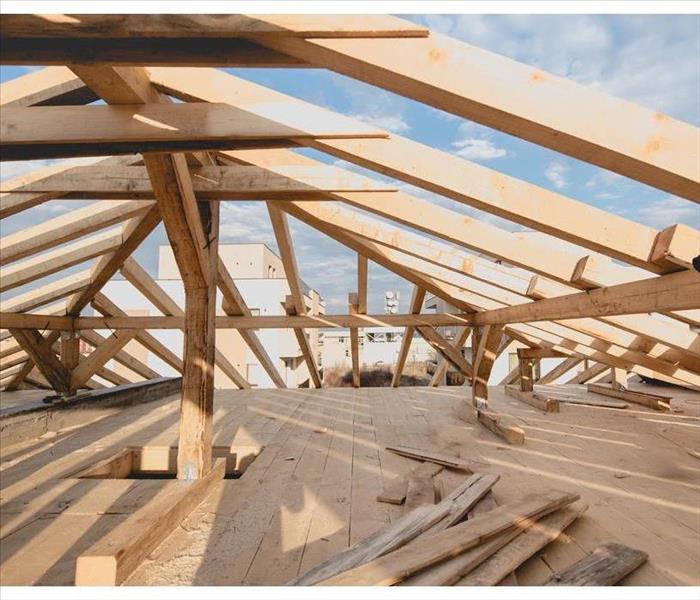 A building’s envelope is, in a very basic sense, the actual building itself.
A building’s envelope is, in a very basic sense, the actual building itself.
Protect Your Building Envelope
Rain damage can be a serious threat to your commercial building, easily causing thousands of dollars worth of damage after a bad storm. The most important thing you can do to protect your building is to ensure that the building envelope is in good shape and well maintained. It is much more cost-effective to maintain the property in such a way as to prevent damage than it is to repair after a weather event.
Rain Damage Can Present Big Problems
In many cases, damage done to commercial buildings is caused by water being where it’s not supposed to be. Black mold is just one example of the serious consequences that can arise when rain is allowed to intrude into the building. Get out ahead of potential problems by making sure that cracks are sealed and gaps are closed. There are other things that can help to divert water:
The use of these items can move water away from the foundation of your building and help to prevent water intrusion.
The Building Envelope and Why It’s Important
A building’s envelope is, in a very basic sense, the actual building itself. It is the physical barrier between the conditioned interior and the unconditioned environment outside. It is comprised of the roof and walls of the structure. Cracks, gaps, and other openings in the envelope, including doors and windows, can all present possible points of entry for water and air into the building.
Maintenance Can Make a Big Difference
Preventative maintenance can save you money in the long run. Once damage has been done, it usually becomes a much more costly situation to rectify. However, should damage to your building occur, bring in professionals to help with cleanup.
It is easier and cheaper to fortify a weak point than it is to replace a larger area that has become subject to rot or mold due to water damage. Keep in mind that Englewood, FL, can be subject to severe weather, including heavy rains. Protect your building from rain damage so it will continue to serve its purpose for years to come.
The Right Way to Clean Your Home Post-Flood: Need-To-Know Requirements
9/19/2021 (Permalink)
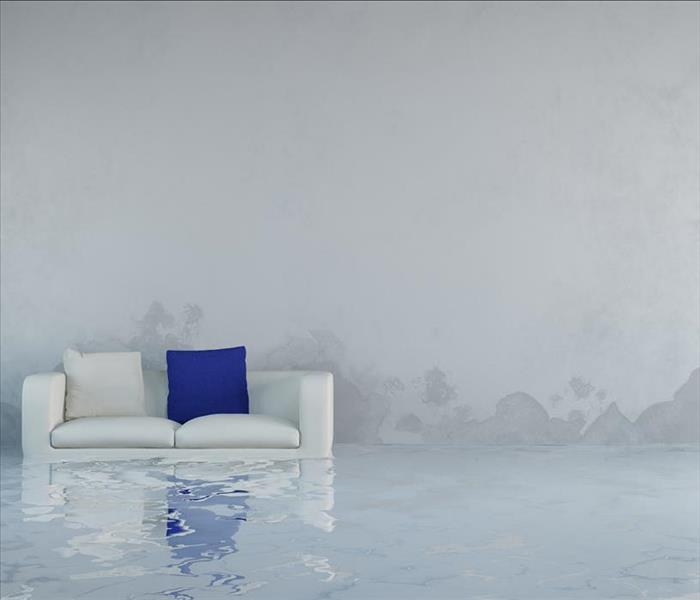 When it comes to cleaning up after a flood, there is a right way and a wrong way to go about it.
When it comes to cleaning up after a flood, there is a right way and a wrong way to go about it.
Though you should never attempt to flood clean on your own, you should be aware of the cleaning requirements that your Englewood, FL, flood cleanup restoration team uses. Requirements are in place for a reason—to keep professionals and homeowners safe and to prevent further damage. Some CDC recommendations that professionals abide by are as follows:
• Block off the contaminated area.
• Don protective clothing.
• Discard contaminated materials.
• Use commercial flood disinfectant.
• Keep the area well ventilated.
• Dry out the area.
Safety Is Key
When you work with a professional flood restoration team, you'll notice that each member of the team takes extra precautions to keep both themselves and occupants of your home safe. Floodwaters often contain harmful contaminants, including but not limited to human waste and harsh chemicals. For this reason, two cleaning requirements that all experts adhere to are to block off contaminated areas and don protective clothing.
Discard What Cannot Be Cleaned
This is probably one of the hardest requirements for homeowners to abide by, as it often involves getting rid of favorite items. Carpets, furniture, curtains, and other porous materials that were in the flood zone likely need to be trashed and replaced.
Use Commercial Disinfectants
Standard house cleaners such as 409 and Tide aren't strong enough to kill the bacteria that float in on floodwater. If you want to ensure that your home is safe to be in, let your water damage cleanup crew wipe down all surfaces with powerful, commercial-grade flood disinfectant.
Get Clean Air Flowing
The air in a room affected by floodwater is bound to be moist, and moist air breeds mold spores. To minimize the risk of mold growth, your flood team is likely to open the windows and use industrial-grade fans to get clean air flowing through. This may also help to speed up the drying process.
When it comes to cleaning up after a flood, there is a right way and a wrong way to go about it. Talk to your Englewood, FL, flood damage restoration team regarding proper cleaning requirements for flood cleanup.
When Can Employees Return to Work During Restoration?
8/31/2021 (Permalink)
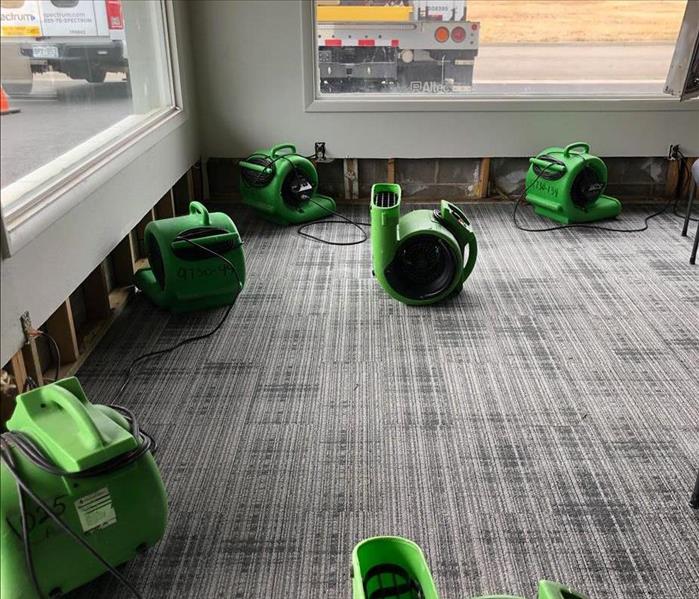 Call SERVPRO for any flood or water damage in your business.
Call SERVPRO for any flood or water damage in your business.
When Will Employees Be Able To Return to Work During Restoration?
Once the flood waters have receded, most people want to return to their businesses. They want to rebuild as soon as possible. As a business owner, you recognize the need to stay away for a while, but the more time you are out of the office, the more money you could potentially lose. In addition to losing money yourself, your employees can have a dent put in their wallets. The question most people have is when they can return to work. Do you have to wait until the building is completely restored or can your employees be present through the flood cleanup?
1. Black Water Removal
Standing water becomes the perfect environment for bacteria and mold growth. If the floodwaters caused any sewer backup, the cleanup is first on the to-do list. No one can come into the building until this is completed. The exception is if they have the proper equipment and are a part of the cleanup crew. A professional restoration company should handle black water.
2. Demolition and Disinfection
Once the specialist removes the water, you can use his or her help to figure out what can be saved and what needs to be thrown out. Often you need to remove drywall, carpeting and other porous materials before you can start to rebuild. These materials are difficult to clean and can be destroyed by black water. Your employees should not be present until after this process is completed. Once the demolition is done and everything has been disinfected, you can begin to think about returning to the regular workday.
3. Return to Work
Once everything has been cleaned, your employees can return while you are rebuilding. You can use air filtration devices to help the air quality while the restoration company does its job. Once you are in the rebuilding process, as long as there is no dangerous construction going on, your employees should be safe.
During a flood cleanup, it can be difficult to allow your employees to return to work right away in your Englewood, FL, business.
If a Storm Cancels Your Flight
8/4/2021 (Permalink)
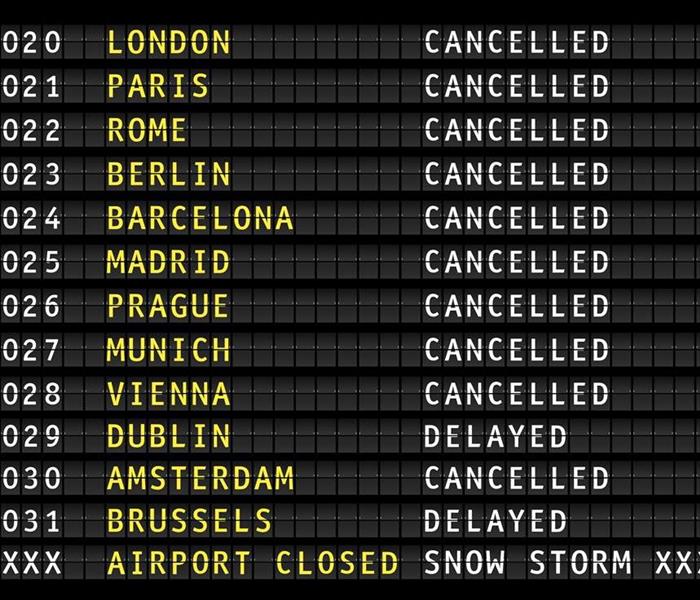 Canceled flight due to storm.
Canceled flight due to storm.
Canceled Flight Due To A Storm
Coping with the fallout of storms can be a nuisance whether you are at home or on the road. Seasoned travelers flying to or from Manasota Key, FL, understand that a weather delay or a canceled flight is always a possibility. However, they also understand that there are proactive and reactive moves to be made when Mother Nature interferes with the best-laid travel plans.
Proactive Moves
Wise travelers have learned the ins and outs of air travel. Sometimes the best defense is a good offense.
• Stay informed about the weather forecasts for your points of departure and arrival.
• If at all possible, avoid travel when inclement weather is predicted.
• Try to book direct flights to avoid layover cities where the weather can factor into your connection’s timeliness.
• Leave early to avoid traffic and airport security delays even if your flight is running late.
• Pack lightly and carry your bag on the plane; retrieving checked baggage can be complicated if your flight changes.
Reactive Moves
If your flight is canceled and following proactive storm tips hasn’t helped, don’t despair. There are a few ways to bounce back from a canceled flight.
• Call the airline as opposed to lining up at the airline’s service desk in the airport. You will be served more quickly over the phone.
• Make the most of what airlines are willing to offer. Ask them to help you rebook or reimburse you for a connecting flight.
• Ask for reimbursement for food or lodging if the delay is substantial.
• Ask for reimbursement for a rental car if driving is an option.
• Don’t lose your cool. Calm and persistent customers have more success in getting what they want than those who display anger.
The airline is not required to compensate you unless it bumps you because it oversold the flight. For a canceled flight due to a storm, you are simply rebooked.
Should a Business Carry Renter's Insurance?
6/18/2021 (Permalink)
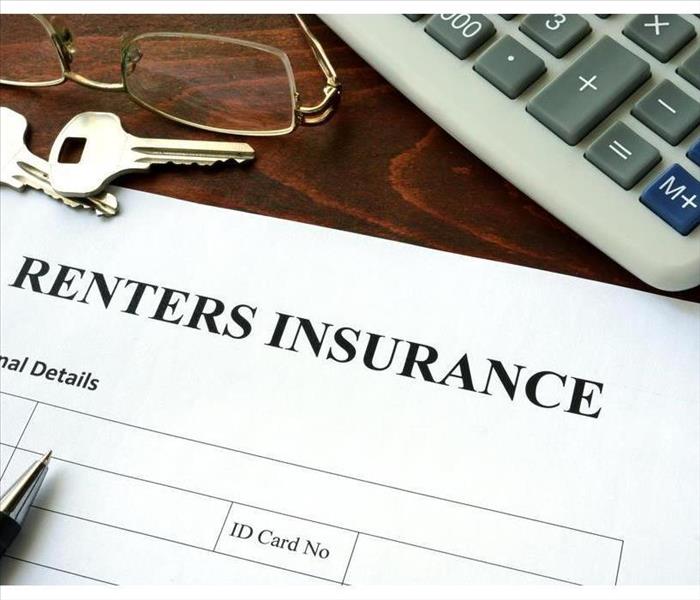 Most small businesses will need some form of renter's insurance.
Most small businesses will need some form of renter's insurance.
Most small businesses don’t own the land they sit on. If your business rents space in Manasota Key, FL, you might consider renter's insurance. This type of policy is tailored for commercial tenants who need three layers of coverage:
- Liability
- Company property
- Loss of use
Doesn’t the Landlord Provide Insurance?
Some landlords provide a certain amount of coverage for tenants. However, that’s usually the exception. Business tenants are legally considered to have a higher degree of sophistication, so they’re generally responsible for their own insurance coverage.
What Does Renter's Insurance Cover?
Any peril covered by standard property insurance is typically covered by a tenant’s policy. The key difference is that the contents of the building are covered, not those items considered part of the building.
Just like a standard property insurance policy, it also doesn’t usually cover flood damage. If you have a flood and it isn’t covered by your insurance, you need a flood damage restoration expert who specializes in a “restore versus replace” mentality to make the process affordable.
Liability for incidents on your property is typically included. Running a business without liability insurance is incredibly risky and normally prohibited by lenders or investors. Renter’s policies also usually cover the move to a new location or the loss of use while your establishment is being restored.
Does It Cover Income Loss?
Definitely not – at least, not without a rider. You need business income interruption insurance to cover lost revenue. This is almost always worthwhile if you can afford it since around 90% of businesses eventually fail without it if they’re forced to close for a disaster.
What Perils Does It Cover?
All the disasters named in your policy would be covered. This typically includes fire, wind, storms, theft and vandalism. The liability portion covers most instances of injury excluding gross negligence on your part. It should be considered the equivalent of standard property owner’s insurance in most ways. However, you should still read the policy since every company has differences.
Most small businesses will need some form of renter's insurance. Call around to find the best price and ideal coverage for your small business.
 Hurricane season is upon us. Call SERVPRO of Englewood, Placida with your home restoration and cleanup needs.
Hurricane season is upon us. Call SERVPRO of Englewood, Placida with your home restoration and cleanup needs.



 24/7 Emergency Service
24/7 Emergency Service



